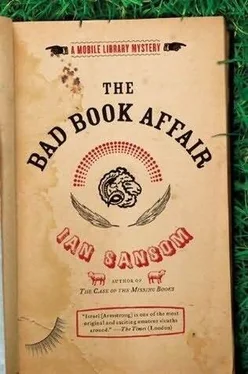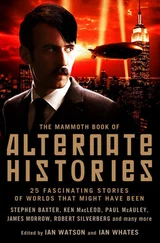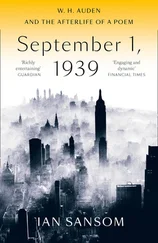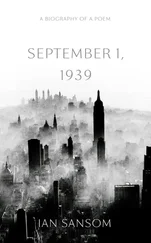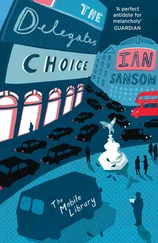The farm was where George had grown up. It was where she remembered her parents living, and where she’d played down by the stream and had run around in the fields. The farm was her entire world: she could imagine no world without it, although outside, the world was passing it by, superseding it, speeding up and crashing, colliding, collapsing, and rapidly remaking itself. Outside was progress, for better or for worse; inside, the Devine household was stasis. The furniture was heavy and inherited; the carpets were orange and thin. Mr. Devine would sit in the good front room by the fire, with crumbling, swirling turquoise wallpaper coming slowly down upon him, with a large pair of foot-operated bellows made of wood and leather at his feet. There was still a butter churner in the kitchen, and earthen bowls, and old brass candlesticks, and a big old mahogany wall clock, with a TV in teak to match. At night George used a brass bed pan with a long wooden handle to warm her in her loneliness, and next to her bed sat an old-fashioned automatic tea maker, her only companion.
George’s bedroom was her sanctuary, or the closest thing to it, and she’d arranged it exactly as she liked: old Roberts radio next to the bed, and her library books in their thick plastic protective covers, and her one concession to luxury, a Cath Kidston floral bedspread that she’d had sent over from London, a concession not merely to luxury, indeed, but to herself: an allowance. Weighing heavily against it was the old woodworm-wracked pine clothes cupboard, made by her father and not made to last, and her parents’ old double bed-a rickety iron frame affair that had been in the farmhouse for generations. Inheritance. She’d been born in the bed and would probably die there too, just like her grandmother before her. The only picture in the room was a poor watercolor, painted by George’s mother when she was young and first married and had come to live there, a painting of the farm, all pure white against green fields and blue skies, expressive of all her hopes of the life she was going to live. Big dreams. Dark red Donegal tweed curtains hung at the windows and down over the deep window ledges, which had been painted over so many times that where the paint was chipped it was possible to see years of colors going back, from whites through creams and down to deep dark browns, like geological strata. Sometimes George would sit picking at the paint, staring out at the fields spread before her, wondering about her own deepening layers, and she would listen to the trills and calls of the birds, and if she closed her eyes she could see her father still, in rolled-up shirtsleeves, tall and spare, always on the go, out in the garden, or in the distance on the tractor. She’d kept all the old accounts books, their covers smudged with white mold, and sometimes she would read through them in bed, reading her father’s, her grandfather’s, and her great-grandfather’s careful detailing of income and expenses. She did all of the accounts on a laptop now-Brownie helped her when he was home from university. But she knew that ultimately it was pointless, that the forces of decay and modernity were about to overwhelm her and the farm and sweep them all away, and there was nothing she could do about it, that what had once been a farm employing half a dozen men was now little more than a small-holding and would soon become nothing.
And of course she spoke of this knowledge, these fears, to no one. And certainly not to Israel Armstrong, whose lodgings in the chicken coop brought the Devines almost half of their monthly income.
Israel had got up late, as usual, this Sunday morning, neurasthenically, and had washed, and dressed and not shaved, and had eaten his customary spoonful of peanut butter and drunk his customary pot of coffee and had now wandered, aimlessly but much refreshed, outside to the yard, where George was busy working, paintbrush in hand.
“What are you doing?”
“What does it look like I’m doing?”
“Erm. I’m guessing here…Painting?”
“Whitewashing,” corrected George.
“Is that the same as painting?”
George just looked at him, eyes wincing.
“Well, anyway,” continued Israel. “Sorry about Friday night, by the way.”
“It’s fine.”
“I…”
“It’s really fine.”
“I just had one or two too many.”
“It’s fine.”
“Are you sure?”
“Yes.”
“OK, then. We’re fine, then?”
“Yes.”
“Well. That looks like fun.”
“Really?”
“Yeah.”
“Fun?”
“Absolutely. Nice way to spend a morning-”
“Afternoon.”
“Whatever. Painting, though. Brightening the place up a bit. Looks very satisfying.”
“Does it?” said George. “Well, here, you satisfy yourself, then.” She handed Israel the brush and stood with her hands on her hips.
“Well, that’s not an invitation I receive very often from a-”
“Just paint, Armstrong.”
“Well, I’d love to help, obviously, but I…erm. I have a few things I need to do.”
“Really?”
“Yes. It’s Sunday. I need to…go and see Pearce.”
“I see.”
“Yes. What’s the time?”
George looked up at the sky.
“About half past two.”
“How do you do that?” said Israel. “I’ve always-”
“Do what?”
“Tell the time by looking at the-”
“Armstrong, I need to get on, if you’re not helping.”
“Sure. Yes. Sorry.” He handed back the paintbrush. Their hands touched briefly. Israel coughed. George looked away. It was nothing: nothing had passed between them.
“Why are you painting the shed?” asked Israel. “Spring clean?”
“It’s September, Armstrong.”
“Yes. Well. A late spring clean.”
“We’re selling the goats,” said George.
“Oh, really? Why? I quite like the goats.”
“Why do you think we’re selling them?”
“I don’t know.”
Israel’s grasp of real-world economics was not great: sketchy, in fact, might be the word. Or feeble. Or poor. Risible. Rum. Quaint. Or pathetic. He was a salary man, when it came down to it, a public employee, so the gulf between him and someone who had to earn their living by the literal sweat of their literal brow was as big as the gap between, say, primitive tribespeople and the Christian missionary come to save them.
“Goats must be sold,” continued George.
“It does seem a shame, though,” said Israel.
“Shame doesn’t come into it,” said George. “It’s a shame when you can’t eat.”
“True. True. Good point,” said Israel. “So why are you painting the shed, if you’re selling the goats?”
George took a deep breath: it was a family trait. Old Mr. Devine did the same when he was roused: an attention to and awareness of one’s own anger, which Israel always found impressive; he was always utterly shocked and surprised by his own emotions.
“To set them off when people come to see them,” explained George patiently.
“Ah,” said Israel. “Right. Presentation. A sort of framing device for the goats?”
George looked at him, unimpressed.
“Anyway,” continued Israel, sticking his head round the shed door and sniffing. “What’s that smell? Is that the-”
“I’ve bleached the floors,” said George.
“Ergh!”
“And it’ll be the alkalis in the whitewash. You don’t want to breathe too much in.”
“Ugh!”
“And don’t touch the walls!” she said as Israel touched the walls. “It’ll have the hand off ye,” said George. “You have to wear gloves.”
“Ahh,” said Israel, staring at his hands. “I touched it!”
“Well, go and rinse your hands, then,” said George.
Israel jogged quickly across the yard to the outside tap, George laughing.
Читать дальше
Конец ознакомительного отрывка
Купить книгу
